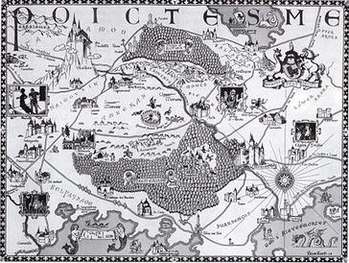Poictesme

Poictesme (pronounced "pwa-tem") is a fictional country or province which forms the setting of the fantasy works of James Branch Cabell, known collectively as Biography of the Life of Manuel. Poictesme is ruled by the Count Dom Manuel.
It was the author's intention to situate Poictesme roughly in the south of France. The name suggests the two real French cities of Poitiers (medieval Poictiers) and Angoulême (medieval Angoulesme). Poictesme is a fief of King Ferdinand of Castile and Leon, who installs Manuel as count in the year 1234. Cabell's fictional history of the country extends as far as the 17th century.[1]
At the height of Cabell's popularity in the 1920s, Cabell's publishers sold framed wall-maps of Poictesme. [2]
The Virginia Commonwealth University undergraduate literary journal is named Poictesme after the fictional province.
Other references
In H. Beam Piper's popular science fiction novel, Junkyard Planet (Putnams 1963 & Wildside Press, 2007 ISBN 978-1-4344-0085-7, also published as "The Cosmic Computer" in paperback edition), Poictesme is the name of the planet on which the main body of the story occurs. A specific reference is made to Cabell.
Poictesme is also a moon of the planet Sauron in War World: The Battle of Sauron by John Carr & Don Hawthorne (Pequod Press, 2007, ISBN 0-937912-04-2).
Poictesme and Lotharingia are two of the three kingdoms in a short story by Isaac Asimov, "Prince Delightful and the Flameless Dragon." The story first appeared in Once Upon a Time: A Treasury of Modern Fairy Tales (Del Rey / Ballantine Books, 1991); it also appears in Asimov's anthology Magic: The Final Fantasy Collection (Harper Collins Publishers, 1996, ISBN 0-06-105205-1).
References
- ↑ Van Doren, Carl. "The Two Heroes of Poictesme: A Study of 'Jurgen' and 'Figures of Earth'". The Century Magazine (November 1924): 129–134. Retrieved 2018-09-06.
- ↑ Darrell Schweitzer, "Cabell, James Branch", in St. James Guide To Fantasy Writers, ed. David Pringle, London, St. James Press, 1996, ISBN 1-55862-205-5, (p. 91-93).